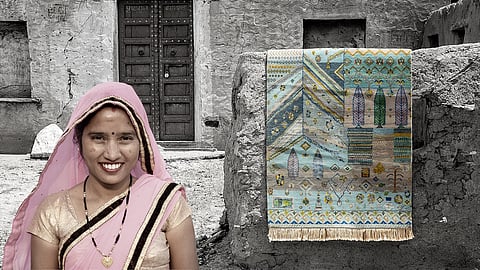

Far away from the hustle of daily life, are villages that breed culture, tradition and art. With values held close to their hearts, work and life combine learned skills and family traditions - and here they find sources of livelihood.
One such village that built its economy based on their traditional art is that of Aaspura in Rajasthan. Tucked away in the interiors of Jaipur, the AAspura lies 67 km from the state capital. With a total literacy rate of 61.8 per cent, the female literacy rate is 24.1 per cent. (onefivenine.com) Women in the village are employed mostly in traditional occupations but form an important section of the working class.
The Bridge Chronicle spoke to Prem Devi an artisan working with Jaipur Rug. Devi has been working with the company for more a decade as a weaver and quality supervisor. She talks to us about her job and how the village survived COVID-19 lockdown.
"Nobody was expecting this in the village. We did not have anyone who was ill around us, and initially, we did not understand the intensity of the matter. Many families had their breadwinners living in cities, and it was very scary for them. There was uncertainty all around the village about how things would shape up," recalled Devi.
But the people of the village continued with their everyday tasks. "It was more or less usual for us because our work did not stop completely.. We usually work from home, so helped us to stay indoors and work. We also avoided losing our income, but because of the restrictions, work was slow," she added.
Daily wage earners were one of the worst affected, due to the pandemic. The struggles of losing their jobs and travelling home were nothing worst than a nightmare. Covid-19 lockdown impact was far overreaching than what we can ever imagine. It has led to a change in attitude and mindset about work. People are now looking forward to finding more stable jobs.
"There is one clear change in the mindset after the lockdown. People now want more stability from their work. They want to work for companies that do not abandon them in difficult times. Also, a lot of them are looking for work closer to the village to avoid migrating to bigger cities and facing hardships alone," explained Devi.
The traditions of weaving rugs in India dates back to the 16th century, when the Great Mughal Akbar, took over the reign in India. He bought with him the best of weavers from Persia and thus began the tradition.
The process of weaving rugs is intricate and skilful. Artisans work on one carpet for numerous days, to create intricate pieces. "Depending on the size and intricacy of the design it takes anywhere between three-six months to weave a rug."
Rugs are not only an important part in India but also hold a rich history. Books suggest that between 1520-1530 Akbar organised weaving training sessions for the prisoners of Agra jails. The initiative was not only practical but also was humane. From common criminals, inmates became artisans. Supposedly, some of them even outgrew their masters!
Today, the Indian carpet industry employees more than two million people, majority hailing from rural areas. It is a highly labour-intensive industry. According to CEPC.co.in, exports from this industry increased from Rs. 4.42 Crores in 1961- 62 to Rs. 11799.46 Crores in 2019-20. Today, Indian carpets are well-appreciated and respected all over the globe. India is also a global leader in the carpet market.
Here's a look at the carpet producing states in India:
Jaipur Rugs
Jaipur Rugs is a family-owned business and has a network of over 40,000 artisans spread across 600 rural Indian villages. They are also working with close to 100 inmates across Jaipur Central Jail, Bikaner Central Jail and Dausa Central Jail to provide them with meaningful and fulfilling work by teaching them the art of carpet weaving.
The founders realised that crime tends to go hand-in-hand with poverty and illiteracy, and imprisonment makes the lives of the families of inmates even more difficult, especially if the one incarcerated is the breadwinner. One way to change this destructive cycle is economic empowerment.
"Let goodness, fairness and, most importantly, love prevail in business. Profits will inevitably follow," says N K Chaudhary, Founder, Jaipur Rugs Company.
"This innovative initiative by Jaipur Rugs and the Prison Department is much needed. Through this, prison inmates are trained in rug weaving and production and their efforts get appreciated globally, leading the way for reformations. The earnings from this initiative help the families of the inmates. Additionally, 25% of the earned income goes to the victim’s families," says Rakesh Mohan, Jail Superintendent, Jaipur Central Jail.
Small initiatives like these help women from the interior regions develop means of livelihood and a way to support their family. It is inspiring to see the change in remote conservative societies. It was because of the job, that Prem Devi, and many other women, were not severely affected by the COVID-19 lockdown and economic shutdown.
